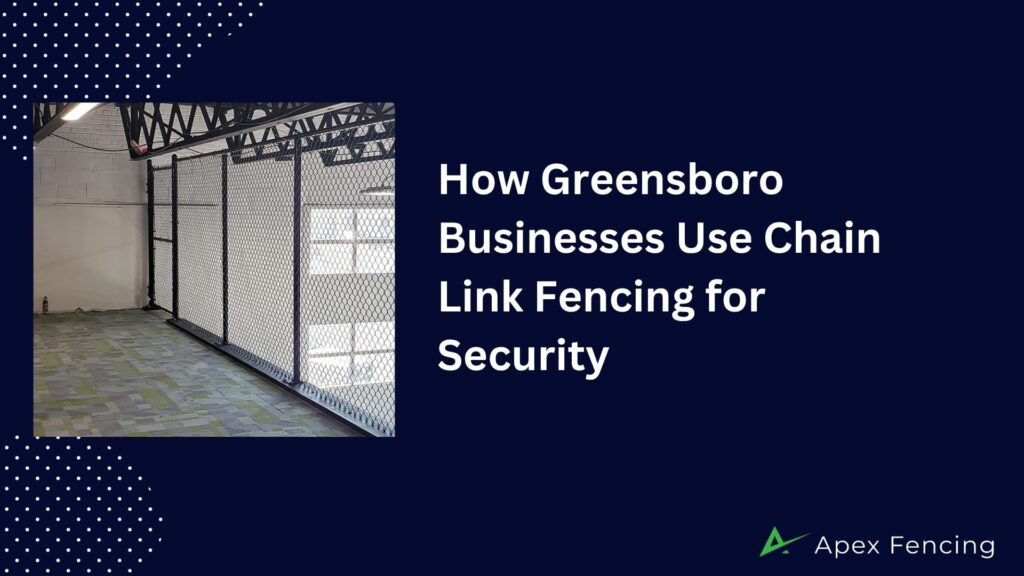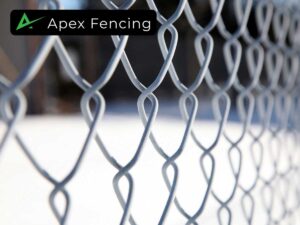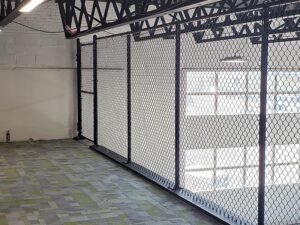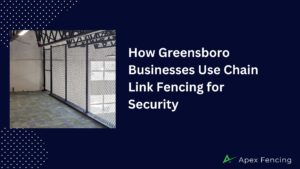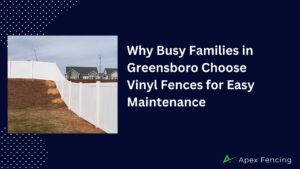Over in Greensboro, you protect warehouses along I-40, retail plazas, construction sites, schools and offices by choosing an affordable, durable, and customizable security solution — chain link fencing; you can add barbed wire or privacy slats and security gates for layered deterrence, and galvanized or vinyl-coated chain link withstands humid summers and rain. Apex Fencing helps you assess cost, installation speed and real-world performance to secure your property long-term.
Key Takeaways:
- Chain link is a cost-effective, fast-to-install choice for Greensboro businesses — warehouses near I‑40, retail plazas, construction sites, schools, and office complexes favor it over wood, aluminum, or vinyl because it’s lower-cost, low-maintenance, and easily customized with barbed wire, privacy slats, and security gates.
- Galvanized or vinyl-coated chain link stands up to Greensboro’s humid subtropical climate — strong resistance to rain and summer heat makes it a durable, long-term investment that reduces repair and replacement needs.
- Chain link delivers strong security with operational visibility — clear sightlines for surveillance, scalable heights/mesh, and seamless integration of locks, automated gates, and accessories; Apex Fencing (apexfencing.us) provides local design, permitting, and commercial installation expertise.
The Importance of Security for Greensboro Businesses
Your commercial property near I-40, retail plaza, or school faces recurring risks from theft, vandalism, and unauthorized access. Chain link fencing offers an affordable, scalable barrier that you can customize with barbed wire, privacy slats, and heavy-duty gates to match risk levels. Local firms like Apex Fencing design systems that balance perimeter deterrence with maintenance needs in Greensboro’s humid subtropical climate.
Overview of Security Challenges
Warehouses along I-40, retail centers, and active construction sites in Greensboro frequently face equipment theft, copper wire stripping, and after-hours break-ins. You also manage trespassing, vandalism, and potential liability from unsecured perimeters. Seasonal storms and humidity accelerate fence wear, so selecting materials that withstand rain and heat reduces long-term risk and maintenance costs.
Current Trends in Business Security
More Greensboro businesses pair chain link with CCTV, motion sensors, and keypad or card access to create layered defenses. You’re seeing increased demand for vinyl-coated meshes and privacy slats to hide assets from view, plus remote monitoring for off-hour alerts. Local installers emphasize fast installs and modular gates so upgrades happen with minimal operational downtime.
Integration of electronic systems with physical fencing gives you actionable security: combining fence-mounted vibration sensors, PTZ cameras, and cloud alerts enables targeted responses rather than blanket patrols. Apex Fencing has retrofitted Greensboro warehouses with fence sensors linked to guard dispatch and timed lighting, allowing managers to cut false alarms and focus on verified events. Contractors increasingly request 8–10 foot vinyl-coated chain link topped with three-strand barbed wire for high-value yards, balancing visibility with deterrence.
The Role of Fencing in Overall Security Strategy
Fencing forms the first physical line you control, defining access points and channeling foot traffic toward monitored entrances. Typical commercial specs run 6–10 feet with options like galvanized or vinyl-coated mesh, barbed top strands, and reinforced gates to integrate with lighting and alarms. Chain link’s visibility helps cameras record intruders while keeping costs and installation time lower than masonry or ornamental alternatives.
Pairing chain link with controlled gates and scheduled access reduces unauthorized entries and simplifies incident investigations by directing camera sightlines. You can expect quick installs—often completed in days for typical commercial runs—reducing downtime for warehouses and retail centers. Galvanized and vinyl-coated finishes stand up to Greensboro’s humidity and heat, offering low maintenance compared with wood fences that rot or vinyl that can warp. Apex Fencing customizes height, coating, and gate hardware to match your operational needs.
Benefits of Chain Link Fencing for Commercial Use
Cost-Effectiveness Compared to Other Fencing Options
You can secure large perimeters for less with chain link, typically costing far less per linear foot than wood, vinyl, or aluminum while still supporting upgrades like barbed wire and automated gates. For many Greensboro warehouses and construction sites, the lower upfront and maintenance costs make chain link the practical choice for long runs and high-traffic sites, letting you allocate budget toward cameras, lighting, or access control instead of expensive materials.
Cost Comparison
| Material | Typical Installed Cost per Linear Foot (Greensboro est.) |
|---|---|
| Chain link (galvanized/commercial) | $8–$20 |
| Wood | $15–$40 |
| Aluminum | $20–$35 |
| Vinyl | $20–$45 |
| Security upgrades (barbed wire, slats) | +$3–$8/ft |
Strength and Durability Against Adverse Weather Conditions
Galvanized or vinyl-coated chain link resists Greensboro’s humidity, summer heat, and frequent rain better than untreated wood and lower-grade metals, delivering service lives commonly in the 15–25 year range with standard maintenance. You’ll see fewer rot and corrosion problems on warehouse perimeters near I-40, and adding a vinyl coating increases UV and rust resistance for outdoor storage yards and school properties.
Concrete-set posts at 30–36 inches depth and commercial-grade 9-gauge mesh are typical specifications Apex Fencing recommends to meet local wind-loads and vandal resistance. Line posts usually space 6–10 feet apart with terminal posts sized larger for gates and corners; proper anchoring and top rails reduce sag and improve wind performance compared to lightweight fence options.
Ease of Installation and Customization
A trained crew can install long runs quickly — often 100–200 linear feet per day depending on site conditions — minimizing business disruption. You can customize height (4–12 ft), add barbed wire, privacy slats, colored vinyl coatings, or integrate security gates and access control to match your facility’s security plan without switching to a more expensive base material.
Privacy slats can block visibility by up to 95%, turning a standard chain link run into a visual barrier for retail plazas or school campuses, while colored vinyl (black/green) blends with landscaping for property managers concerned with aesthetics. Modular gate options include manual, electric, and crash-rated systems for high-security sites; Apex Fencing handles phased installs so you can maintain operations during upgrades.
Choosing Chain Link Fencing: Factors to Consider
Assessing height, coating, mesh gauge, gate types, and added deterrents helps you match a fence to your facility’s risk profile and budget; warehouses near I-40 often favor taller, reinforced systems while retail plazas use 4–6 ft for perimeter control. Consider lifecycle costs—commercial chain link fencing Greensboro NC is typically more cost-effective than wood or aluminum for comparable durability.
- Height & local regulations
- Coating type (galvanized / vinyl-coated)
- Mesh size & wire gauge
- Accessories: barbed wire, privacy slats, gates
- Installation, drainage, and maintenance
- The best results for business security fencing Greensboro come from pairing an 8–12 ft industrial fence with professional installation by local teams like Apex Fencing.
Height Options and Local Regulations
Typical commercial heights run 6–8 ft for general properties, 10–12 ft for warehouses and high-risk yards, and 4 ft for low-profile retail boundaries; you should plan for 2–3 ft of clearance below in sloped sites. Permit or zoning limits may affect perimeter heights in certain districts, and you’ll often add a 45° extension with barbed or concertina wire for added deterrence on industrial lots.
Coating Options: Galvanized vs. Vinyl-Coated
Galvanized mesh offers an economical zinc barrier against corrosion and typically performs well in Greensboro’s humid subtropical climate; vinyl-coated (polyethylene) adds a colored layer that improves UV and moisture resistance while enhancing appearance for storefronts or schools. You’ll pay more up front for vinyl but gain better aesthetics and slightly extended service life.
Galvanized finishes range from standard batch hot-dip coatings to heavier-duty double-dipped or continuous-process options—G60 and G90 denote zinc weights used in industry specs—while vinyl coatings are applied over galvanized wire in 2–8 mil thicknesses depending on product grade. In practice, galvanized fences often last 15–20 years with minimal upkeep in Greensboro, whereas quality vinyl-coated systems commonly exceed that lifespan and lower visible rusting; factor a 10–30% premium for vinyl and evaluate warranty terms from installers like Apex Fencing.
Adding Security Features for Enhanced Protection
Options include barbed or razor wire, privacy slats (reduce visibility up to 80–90% depending on profile), anti-climb topping, automatic slide gates with keypad or card access, and integrated lighting or camera mounts to deter intrusion and improve response times. Match features to threat level—construction sites may only need temporary top-strand barbed wire, while distribution centers often require full perimeter hardening.
Combine measures for layered defense: an 8–10 ft chain link with a 45° barbed-wire arm and 3 strands of concertina at the top deters forced entry, privacy slats minimize theft-by-opportunity at retail plazas, and electrified or tamper alarms at gate points deliver monitored alerts. For surveillance, mount cameras on 12–16 ft poles with 15–25 ft lighting spacing to eliminate dark approach vectors; coordinate gate automation, card readers, and fence topology with Apex Fencing to ensure proper clearances, access control, and maintenance access.
Common Applications of Chain Link Fencing in Greensboro
You see chain link protecting everything from warehouses along I-40 to small retail plazas because it blends affordability with adaptability: galvanized or vinyl-coated mesh resists Greensboro’s humid subtropical weather, installs quickly, and accepts add-ons like barbed wire, privacy slats, and electronic gates so your perimeter matches your risk profile and budget.
Construction Sites: Temporary Security Solutions
You can deploy 6–8 foot temporary chain link panels around job sites to deter theft of equipment and materials; modular panels and tension-wire systems let crews secure perimeters in a day, add privacy slats for dust control, and mount lockable chain-link gates for controlled access during off-hours.
Industrial and Commercial Spaces: Longer-Term Needs
You’ll often choose 8–12 foot commercial chain link for warehouses and distribution centers to create a durable perimeter that supports barbed or razor wire, controlled vehicle gates, and surveillance mounts—an economical alternative to masonry that still meets heavy-duty security requirements.
For high-value yards—truck staging, outdoor storage, or manufacturing lots—you should specify thicker posts, concrete-set footings, and vinyl-coated or hot-dipped galvanization to extend service life in Greensboro’s climate; integrate slide or cantilever gates with keycard readers or keypad interlocks and place cameras at 20–30 foot intervals for full coverage. Apex Fencing installs these systems and can design a phased upgrade so you balance upfront cost with long-term protection and maintenance savings.
Public Spaces: Schools, Parks, and Recreational Areas
You’ll find 4–6 foot chain link around playgrounds and parks to keep visibility for supervision while using 6–8 foot or taller fencing for school perimeters and athletic fields; mesh choices, clamp-on rails, and rounded top rails reduce injury risk while remaining low-maintenance for municipal budgets.
Design decisions hinge on use: playgrounds prioritize sightlines and tamper-resistant fittings, athletic fields use 10–20 foot backstops and wind-resistant mesh for ball containment, and schools often combine 6–8 foot fencing with controlled pedestrian gates and emergency vehicle access. Specifying rounded top rails, tamper-proof fasteners, and a galvanized finish gives you a durable, community-friendly solution that facilities managers can maintain with minimal downtime.
Enhancing Security with Chain Link Fencing
Across Greensboro — from warehouses near I-40 to retail plazas and schools — you can boost perimeter defense quickly and affordably by choosing galvanized or vinyl-coated chain link paired with targeted upgrades. Chain link’s cost-effective footprint and rapid installation let you deploy barriers that resist humid subtropical weather, then layer gates, lighting, or barbed wire where threat levels are highest so your property stays secure without excessive capital outlay.
Integrating Technology: Access Control Systems
Pairing chain link gates with motorized slide or swing units, keypad/card readers, vehicle loop detectors and intercoms gives you centralized control over entry points; many Greensboro warehouses install commercial electric gates integrated with CCTV and 24/7 remote monitoring to log access and deter tailgating. You can link gate controllers to your existing security platform or implement cloud-based credentials to scale across multiple lots and shifts.
Physical Security Additions: Barbed Wire, Privacy Slats
Adding barbed wire or concertina at the top of a 6–8 ft chain link fence increases the physical barrier while privacy slats reduce sightlines for trespassers; many Greensboro construction sites and storage yards combine both for layered defense, choosing vinyl slats that match branding and resist humidity-driven corrosion.
Standard practice is to mount 2–3 strands of barbed or razor wire on angled top arms to raise the effective deterrent, and use slats that typically reduce visibility by 70–90% depending on weave and slat profile. You should account for added wind load and pick galvanized or vinyl-coated materials for longevity in Greensboro’s climate, and work with Apex Fencing to ensure installation meets local property and safety considerations.
Lighting Solutions for Increased Visibility and Security
Well-placed LED wall packs, pole-mounted floodlights, and motion-controlled fixtures dramatically improve CCTV performance and deter after-hours intrusion; switching to LEDs can cut energy use by roughly 50–70% compared with older HID lamps, making night-time security both effective and economical for your property.
Mounting fixtures 12–20 ft high and spacing them about 40–60 ft apart creates uniform perimeter illumination with fewer blind spots, while motion sensors, timers and integration with cameras let you spotlight activity only when needed. For remote lots or sites where trenching is costly, consider solar-powered LED poles paired with battery-backed controls to maintain continuous coverage and reduce installation time.
Chain Link Fencing: A Comparison with Other Materials
Chain link delivers a blend of low cost, fast installation, and customizable security—barbed wire, privacy slats, and keyed gates—making it the go-to for Greensboro warehouses, schools, and construction sites. Galvanized or vinyl-coated mesh resists rust in the city’s humid subtropical climate, offering a practical lifespan of decades with minimal maintenance compared with wood or untreated metals. Apex Fencing installs commercial chain link that typically costs significantly less per linear foot than ornamental options while retaining reliable perimeter control.
Material Comparison
| Chain Link | Affordable, quick to install, customizable with slats/barbed wire; resists Greensboro humidity when galvanized or vinyl-coated. |
| Wood | Good privacy/aesthetics but needs regular staining; vulnerable to rot and termites in humid conditions. |
| Vinyl | High curb appeal and low routine care; can fade or crack in prolonged summer heat and costs more upfront. |
| Aluminum / Wrought Iron | Ornamental and durable; wrought iron offers top security but at substantially higher cost and maintenance for rust prevention. |
Wood Fencing: Pros and Cons
You get strong visual privacy and sound dampening with wood, making it popular for storefronts or office courtyards, but ongoing upkeep is required: staining every 2–5 years and repairs after storms. Rot, warping, and termite damage shorten effective lifespan compared with galvanized chain link, and total lifecycle costs often exceed initial savings for busy commercial sites.
Wood Fencing — Pros vs Cons
| Pros | Cons |
| High privacy and traditional look | Susceptible to rot and termites |
| Good sound reduction | Frequent maintenance: staining/painting |
| Relatively low initial visual cost | Shorter lifespan in humid climates |
| Easy to customize height/panels | Panels can warp or split after storms |
| Replaceable sections | Labor-intensive repairs |
Vinyl Fencing: Aesthetic Appeal vs. Durability
You benefit from a clean, maintenance-light appearance with vinyl—retail plazas and office entrances favor it for curb appeal—but extended summer heat in Greensboro can cause UV fading and thermal expansion, and replacement costs exceed chain link, making vinyl less practical for large perimeters like warehouses.
Manufacturers commonly back vinyl with 20–30 year warranties, yet in real-world Greensboro installations you should expect periodic panel replacement after extreme sun exposure or impact damage. For mixed-use sites, proprietors often pair vinyl in front-facing areas with chain link around service yards to balance aesthetics and cost-effectiveness.
Aluminum and Wrought Iron: Cost vs. Effectiveness
You gain strong visual security with aluminum’s corrosion resistance and wrought iron’s robustness; aluminum is typically lower-cost and powder-coated for longevity, while wrought iron provides high physical deterrence but comes with steep upfront and maintenance expenses for rust control.
Average installed costs for ornamental metals can run several times higher per linear foot than commercial chain link; facility directors often choose aluminum for office landscaping and wrought iron for marquee properties, but for long, secure perimeters — such as industrial yards near I-40 — you’ll often get better value using chain link with security add-ons.
Local Considerations for Chain Link Fencing in Greensboro
Climate Impacts on Fencing Longevity
Greensboro’s humid subtropical weather accelerates corrosion and wear, so you should specify galvanized (G60/G90) or vinyl-coated chain link and powder-coated posts to resist rain and summer heat. Commercial sites near I-40 or industrial yards benefit from 9-gauge mesh and concrete-set posts for stability during storms. Apex Fencing recommends routine inspections every 12 months and targeted touch-ups after heavy rains to preserve security performance and extend service life.
Zoning Laws and Permits for Installation
Commercial fence projects in Greensboro typically require permits, with common rules covering height, setbacks, easements, and sight triangles at intersections; many properties allow 8–10 ft for industrial sites but front-yard heights may be lower. You risk stop-work orders, fines, or mandated removal for installations without proper approval, so coordinate with City of Greensboro Planning and Inspections or let Apex Fencing manage approvals for you.
Start by confirming your parcel’s zoning designation and any overlay districts that affect fence standards; submit a site plan showing property lines, gate locations, and utility easements. Electric or automated gates need electrical permits and inspections, and historic districts or schools often impose stricter materials and color limits. Expect review timelines to vary—budget for a permit window and factor permit conditions into your project schedule; Apex Fencing can prepare drawings and handle submittals to speed approvals.
Aesthetic Guidelines by Homeowners Associations
HOAs around Greensboro frequently restrict plain galvanized chain link in visible areas, favoring black or dark green vinyl-coated mesh, limited heights in front yards, and pre-approval through an architectural review committee. You should submit material samples and elevations early; many HOAs allow privacy slats only behind the building line and may require fencing to match neighborhood character to avoid fines or removal orders.
Prepare a package with photos, product specs, and a plotted site plan for the HOA’s ARC to minimize revisions. Common HOA conditions include matching post caps, concealing hardware, and using landscaping to soften views. Choosing vinyl-coated chain link in approved colors often resolves objections by balancing your security needs with the community’s visual standards—Apex Fencing can provide sample panels and renderings to streamline ARC approval.
Cost Analysis of Chain Link Fencing
You can expect chain link costs to vary with height, coating, and security add-ons; typical commercial installations in Greensboro range from about $15–$35 per linear foot for standard 6-foot galvanized fence to higher for vinyl coating or anti-climb options. Galvanized systems commonly last 20–30 years in Greensboro’s humid subtropical climate, so upfront savings often translate into lower lifecycle costs compared with wood or aluminum alternatives.
Breakdown of Installation Costs
Material prices usually form the largest share: chain link fabric, posts, and fittings. Labor and site prep add substantially if you need old fence removal or grading. Expect standard installs roughly $15–$35/ft; adding barbed wire, privacy slats, or a commercial gate pushes totals to $30–$75/ft. Single manual gates commonly run $400–$1,200, while automated or heavy-duty security gates can exceed $3,000. Apex Fencing provides on-site estimates to account for terrain and permit needs.
Long-Term Financial Benefits of Chain Link Fencing
Durability and low maintenance produce measurable savings: galvanized and vinyl-coated chain link resist corrosion and UV exposure, reducing repainting and replacement frequency; you’ll typically avoid major repairs for two decades. Lower upkeep compared with wood (which may need replacement every 10–15 years) means predictable budgeting for facility directors and property managers in Greensboro.
Over a 20-year horizon a properly installed commercial chain link fence usually requires only occasional gate repairs, tensioning, or isolated post replacement, keeping annual maintenance costs relatively low. For example, a 500-foot, 6-foot galvanized fence that costs roughly $10,000–$17,500 to install often incurs under $500/year in upkeep, while wood alternatives can have cyclical repainting and replacement expenses that raise total lifecycle cost by thousands.
Return on Investment for Businesses
Perimeter security reduces unauthorized access and can lower theft and vandalism exposure, which directly affects operating losses and insurance risk assessments; many businesses recoup installation costs through reduced shrinkage and insurance adjustments within a few years. Choosing features like barbed wire, higher heights, or secure gates increases deterrence and accelerates payback for high-risk sites such as warehouses near I-40 or equipment yards.
To estimate ROI, total your installation cost, annual maintenance savings versus an alternative (for example, wood), and projected loss reduction from improved security. A sample calculation: a $15,000 install that cuts annual losses and maintenance by $2,500 yields payback in about 6 years, after which you benefit from ongoing protection and lower recurring expenses — a common outcome for Greensboro commercial properties served by Apex Fencing.
Maintenance Guidelines for Chain Link Fencing
Keep your perimeter reliable with scheduled care: inspect after storms, clear vegetation, and address corrosion before it spreads. In Greensboro’s humid climate, choose galvanized or vinyl-coated finishes for longer life and plan professional checks annually — contact Greensboro’s Premier Fence Company for inspections and repairs that complement work by local experts like Apex Fencing.
Routine Inspections and Upkeep
You should perform a visual inspection every 3 months and after severe weather: check post plumb, mesh tension, gate alignment, and tension bands. Clean debris and mildew annually with mild detergent, lubricate hinges and latches every 6 months, and trim vegetation to prevent trapped moisture; these steps typically prevent >70% of common failures on commercial sites.
Identifying Signs of Wear and Tear
Look for concentrated rust spots, broken or missing ties, sagging fabric, bent line posts, and gates that stick or misalign; small surface rust is manageable, but spreading corrosion or fabric tears are warning signs. Note any sections where mesh has separated from top rail or ground clearance exceeds 2 inches—those are immediate priorities.
Surface pitting alone can be treated with rust inhibitor and touch-up coating, but perforation, holes larger than 1 inch, or posts leaning more than 2 inches over a 6‑foot span indicate structural compromise. Check footings for erosion and test gates under load; if multiple adjacent panels show the same failure mode, the problem is systemic rather than localized.
When to Repair vs. When to Replace
Patch small holes, replace broken ties, re-tension fabric, and swap single posts to extend service life; opt for repairs when damage affects less than about 25% of a run. Choose full replacement if corrosion spans multiple posts, >50% of the fabric is compromised, or gate frames are twisted beyond realignment.
Consider lifecycle numbers: galvanized fabric usually lasts around 15–20 years in Greensboro, vinyl-coated often reaches 20–25 years. Repair when localized issues cost a fraction of replacement; plan full replacement when recurring repairs exceed roughly 30–40% of replacement cost or when security is measurably reduced across the perimeter.
The Process of Installing Chain Link Fencing
Site preparation, post placement, tensioning the fabric and installing gates typically make up the installation process; you should expect crews to space posts 8–10 feet apart, set posts 30–36 inches deep in concrete footings, and finish most standard commercial runs in 1–2 days per 100–300 linear feet. Add-ons like barbed wire, privacy slats, or automated gates are installed last to meet your security and privacy needs in Greensboro’s humid subtropical climate.
Initial Consultation and Site Assessment
During your consultation, crews measure property lines, check easements, and locate underground utilities with NC One Call before quoting; typical recommendations include fence heights from 6–10 feet for warehouses or schools and post spacing of 8–10 feet. Apex Fencing will provide a written site plan, permit guidance, and a clear cost estimate so you know the scope, timeline, and any site-specific risks like slope or drainage issues.
Installation Day: What to Expect
Crew arrival is coordinated with your schedule and may include a 2–4 person team using augers, post levels, and tensioning tools; expect post holes to be dug, concrete poured, and fabric stretched before gates are hung. For sites near I‑40 or active retail plazas, crews manage traffic and staging to minimize disruption while ensuring safe work areas and compliance with local codes.
Work sequence begins with stake-out and hole drilling, then setting posts in concrete and allowing initial cure time, followed by installing top rails, stretching the mesh with a tension bar and winch, and fastening with tie wires and rail caps. Final tasks include hanging and aligning gates, adding privacy slats or barbed wire if specified, and performing a security check to validate tension and gate operation.
Post-Installation Review and Follow-Up
After installation you receive a walkthrough showing gate operation, lock options, and maintenance tips; installers complete a punch list and provide warranty paperwork—many commercial systems include a materials warranty and a 30–day follow-up inspection from Apex Fencing to confirm concrete cure and tension stability. Photodocumented completion helps your records for asset management and insurance.
Follow-up covers checking post plumbness, mesh tension, gate alignment, and any settling around footings; recommended routine inspections are at 30 days, 6 months, then annually, with service contracts available for preventive maintenance. For installations with barbed wire, Apex Fencing marks hazards and advises on signage and lockboxes to keep your site compliant and secure.
Case Studies: Successful Chain Link Fencing Installations
Local projects show how commercial chain link fencing Greensboro NC delivers measurable security: warehouses converted 500–1,200 linear feet to 8 ft galvanized fences with barbed wire, retail centers used vinyl-coated 6 ft runs to enclose loading docks, and schools installed 4–6 ft fences around playgrounds within 48–72 hours. Apex Fencing handled permits and installation, helping you balance business security fencing Greensboro costs and uptime while improving loss control and perimeter visibility.
- 1) Warehouse near I-40: 1,000 linear feet of 8 ft galvanized chain link + 3-strand barbed wire; installed in 4 days; reported 45% reduction in after-hours theft in 12 months.
- 2) Construction site in northwest Greensboro: 600 ft of temporary 6 ft chain link with lockable swing gates; setup in 1 day; material loss incidents dropped from 11 to 3 over a 6-month phase.
- 3) Retail plaza storage yard: 350 ft of vinyl-coated 6 ft chain link with privacy slats for screened storage; installation in 2 days; shrinkage related to outdoor inventory fell by 38%.
- 4) Elementary school retrofit: 300 ft of 4–6 ft chain link with tamper-resistant fittings; completed in 48 hours between semesters; unauthorized entry events decreased by 70%.
- 5) Office complex perimeter: 450 ft of galvanized 6 ft chain link with keypad vehicle gate; installed in 3 days; access-control incidents reduced and visitor screening time improved by 30%.
- Average commercial installed cost in Greensboro: approximately $15–$30 per linear foot depending on height, coatings, and add-ons (barbed wire, gates, slats).
Construction Industry: Loss Prevention
Active sites often use 6–8 ft galvanized chain link with lockable gates and temporary paneling so you can secure materials fast; one site installed 600 linear feet in a day and cut tool theft from 11 incidents to 3 within six months by combining fencing with gated access and nightly lighting supplied by Apex Fencing.
Retail Sector: Enclosed Storage Areas
Retail managers enclose back-of-house areas with vinyl-coated 6 ft fences and privacy slats to protect palletized goods; a Greensboro plaza installed 350 linear feet and saw outdoor-inventory shrinkage fall by 38% while preserving customer-facing aesthetics.
Adding keyed gates, CCTV mounts, and privacy slats helps you restrict staff-only zones without building permanent walls; slats reduce visual theft cues, vinyl coatings resist humidity-driven corrosion in Greensboro, and coordinated installation with Apex Fencing kept the plaza open during setup.
Educational Institutions: Securing Playgrounds
Schools choose 4–6 ft chain link with tamper-proof hardware to protect play areas and meet safety policies; one elementary school installed 300 linear feet in 48 hours between terms, reducing unauthorized access events by 70% and maintaining sightlines for staff supervision.
Pairing fences with self-closing gates, rounded-top rails, and vinyl coatings gives you a low-maintenance, weather-resistant barrier that preserves visibility for supervision while preventing off-campus wanderings; Apex Fencing handled permits and staged work to avoid disrupting school hours.
Future Trends in Fencing Security Solutions
Expect fencing to blend traditional chain link benefits with digital and sustainable upgrades that matter for your Greensboro site. Projects near I‑40 and industrial parks are moving toward taller 6–12 ft systems with integrated sensors, powder coatings, and privacy slats, giving you cost-effective perimeter control while resisting the region’s humidity and summer heat. Apex Fencing advises pairing robust materials with monitoring to lower vandalism and unauthorized access risk at warehouses, schools, and retail plazas.
Advancements in Materials and Design
Stronger wire gauges (9–11 gauge), tighter mesh patterns, and improved coatings like hot‑dip galvanizing plus polyester or vinyl finish extend service life to decades in Greensboro’s humid subtropical climate. You can add anti‑climb top rails, barbed or razor wire, and privacy slats to deter intruders without large cost jumps; these options typically keep fence replacement and maintenance costs far below wood or ornamental steel alternatives favored elsewhere.
Smart Fencing Technologies
Perimeter sensors—fiber‑optic, tension, and vibration—are being mounted directly to chain link to detect cutting, climbing, or tampering and push alerts to your security console or phone. Integrations with CCTV, access control gates, and cloud monitoring let you verify events fast, reducing response windows and the chance of repeated breaches; instant detection of a cut or climb can be the difference between a scare and a loss.
Field installations in Greensboro commonly pair PoE cameras and solar‑assisted sensors to avoid costly trenching; you can deploy edge analytics to filter out animals or wind, cutting false alarms while preserving bandwidth. Apex Fencing can design systems that log events, timestamp footage, and feed your facility management dashboard so your team reacts within minutes rather than hours.
Increasing Demand for Sustainable Materials
Recycled and recyclable steel chain link, low‑VOC powder coatings, and longer‑lasting galvanizing meet rising demand for greener fencing that still performs in wet, warm conditions. Choosing recyclable materials reduces landfill waste and often lowers lifecycle cost; you gain secure perimeters that align with corporate sustainability goals without sacrificing the durability and affordability you rely on.
Local projects show tangible benefits: specifying recycled‑content chain link and powder coats cuts routine repainting and replacement cycles, lowering maintenance budgets for schools and property managers. Apex Fencing works with suppliers to source materials that qualify for green building programs and help you document lifecycle savings for stakeholders.
Legal Considerations for Fencing Installation
Understanding Liability and Insurance Implications
Assess how fence height, gate hardware and lighting change your premises liability: an 8–10 ft chain link with locked sliding gates and anti-climb topping can deter trespassers, while a malfunctioning gate or missing signage can raise your exposure. Insurance underwriters often expect maintenance logs and proof of professional installation; lack of upkeep or DIY errors may lead to reduced coverage or claim denial. Work with your carrier and a fence contractor like Apex Fencing to document specifications and service records.
Compliance with Local Ordinances
Verify permit requirements, setbacks and visibility triangle rules before ordering materials; commercial installations in Greensboro typically require a building permit and may need site plans showing setbacks and fence height. Coordinate a utility locate through 811 before any excavation to avoid costly damage and code violations. Bring permit-ready drawings to your contractor so installation meets inspection standards without delays.
Different Greensboro zones impose different standards: industrial sites and warehouses near I-40 commonly install taller fences with barbed wire, while downtown or mixed-use parcels face stricter streetscape and sight-line rules. Variances or special permits can be required if you exceed usual heights or add security toppings; expect a review timeline and fees, and have Apex Fencing assist with permit pulls and code interpretation to streamline approval.
Navigating HOA Rules and Guidelines
HOAs often regulate fence materials, finish, color, and maximum height; you must submit product specs, elevation drawings and photos for Architectural Review Board approval. Some HOAs prohibit barbed wire or require privacy slats to match neighborhood aesthetics, and noncompliance can trigger fines or removal orders. Prepare documentation that demonstrates how your chain link will meet design standards.
Obtain the HOA’s design standards document and follow submission checklists closely—many associations review applications within 2–6 weeks and may request samples or a maintenance plan. Commercial HOAs for retail plazas or office parks sometimes approve vinyl-coated chain link but ban security toppings; provide proof of warranty, sample panels and a contractor timeline (Apex Fencing can supply these) to speed approval and avoid costly rework.
Summing up
Summing up, in Greensboro you rely on chain link fencing for affordable, durable commercial perimeter protection — from warehouses near I‑40 and construction sites to schools and retail plazas. Galvanized or vinyl‑coated chain link withstands Greensboro’s humid subtropical weather, installs quickly, and is customizable with barbed wire, privacy slats, and heavy‑duty gates to meet your security needs. Compared with wood, aluminum, or vinyl, it delivers lower lifecycle costs and easier maintenance, and local experts like Apex Fencing can tailor installations to your site and budget.

